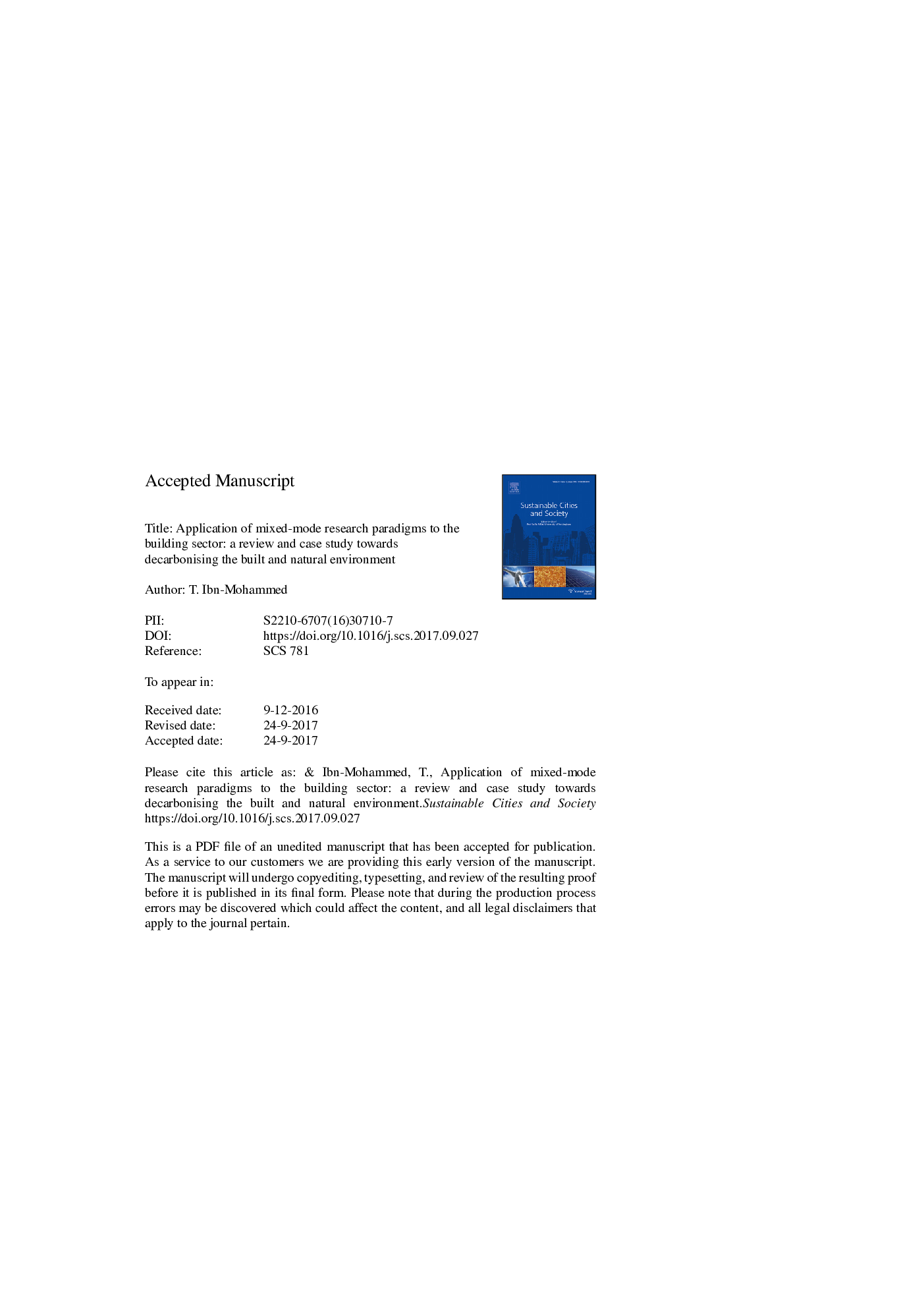| کد مقاله | کد نشریه | سال انتشار | مقاله انگلیسی | نسخه تمام متن |
|---|---|---|---|---|
| 4928073 | 1432013 | 2017 | 56 صفحه PDF | دانلود رایگان |
عنوان انگلیسی مقاله ISI
Application of mixed-mode research paradigms to the building sector: A review and case study towards decarbonising the built and natural environment
ترجمه فارسی عنوان
استفاده از پارادایم های تحقیقاتی مخلوط حالت به بخش ساختمان: بررسی و مطالعه موردی به منظور کاهش میزان تولید طبیعی و محیط زیست طبیعی
دانلود مقاله + سفارش ترجمه
دانلود مقاله ISI انگلیسی
رایگان برای ایرانیان
کلمات کلیدی
پارادایم های تحقیقاتی، رویکرد کیفی و کمی، رویکرد مخلوط حالت، تحقیق در بخش ساختمان، مدیریت زیست محیطی، دکوپلاستی سیستم های پشتیبانی تصمیم،
ترجمه چکیده
بخش ساختمان بخش مهمی از مشکلات تغییر آب و هوا را تشکیل می دهد، و تنها بزرگترین مشارکت در انتشار گازهای گلخانه ای است. با این وجود، این بخش در کاهش تغییرات اقلیمی کم هزینه در سراسر جهان می باشد و این امر یک عنصر جامع در فرایند کاهش میزان سوخت گیری است و این امکان را برای ایجاد توسعه سیاست های مؤثر مورد نیاز جهت هدایت حرکت به سوی آینده ای با پایدار با کم کربن فراهم می آورد. به همین ترتیب، تحقیقات برشده و تاثیرگذار زیادی در این بخش انجام شده است. با این وجود، تقارنی و ناسازگاری در ادغام پارادایم های تحقیقاتی برای رسیدگی به چالش های موجود در بخش وجود دارد، در حالی که بیشتر تحقیقات، رویکردهای کمی و کیفی یا خالصی خالص را اتخاذ می کنند. تحقیق در بخش شامل پدیده هایی نظیر ادراک، احساسات و الگوهای رفتاری مختلف است که به ذینفعان مربوط می شود و تعدادی از تحقیقات نشان می دهد که استفاده از پارادایم تحقیق تک حالت اغلب در بررسی این عوامل ناکام ماند. با توجه به ماهیت پیچیده تعامل بین بازیگران کلیدی (به عنوان مثال جامعه و سیستم های اجتماعی و محیطی) در بخش، استفاده از پارادایم های تحقیقاتی مخلوط حالت برای رسیدگی به این ضعف، در حالی که افزایش تحقیقات در این بخش، اهمیت دارد. در این زمینه، این مقاله، پارادایم های موجود را از طریق یک مطالعه موردی بررسی می کند تا نشان دهد که چگونه یک برنامه تحقیقاتی درون بخش می تواند از آغاز تا بهره برداری با استفاده از رویکردهای مخلوط، شکل بگیرد. مقاله نشان دهنده توسعه یک مدل انرژی کمی در قالب یک سیستم حمایت از تصمیم برای تهیه پیش نویس توصیه های تکمیل انرژی است. یک استراتژی ارزیابی کیفی که فاکتورهای اجتماعی را برجسته می کند که بر گسترش نوآوری های جدید به منظور تلاش برای کاهش هزینه های زیست محیطی تأثیر می گذارد، به طور مساوی فراهم می شود. همچنین موضع گیری های فلسفی مربوط به تحقیق در بخش و تکامل یک مسئله تحقیقاتی ناشی از شناسایی شکاف دانش در زمینه و اقدامات لازم برای تحقق اهداف تحقیق است. مفاهیم که در این مقاله نشان داده شده است می توانند برای آکادمیک، دانش پژوهان دکترا، پژوهشگران حرفه ای اولیه، سیاست گذاران و متخصصان متفقین در درک قدم های کلیدی مورد نیاز برای تشکیل یک برنامه تحقیقاتی برای هدف قرار دادن بخش ساختمان و سایر بخش های مرتبط مفید باشد.
موضوعات مرتبط
مهندسی و علوم پایه
مهندسی انرژی
انرژی های تجدید پذیر، توسعه پایدار و محیط زیست
چکیده انگلیسی
The building sector constitute a critical part of the climate change problems, representing the single largest contributor to greenhouse gas emissions. Yet, the sector is central to low-cost climate change mitigation worldwide, making it an integral element in the process of decarbonisation, with the potential to induce effective policy development required to guide the move towards a sustainable low-carbon future. As such, a great deal of cutting-edge and impactful research targeting the sector has been carried out. However, there are fragmentations and inconsistencies in integrating research paradigms to addressing challenges within the sector, with most research adopting either pure qualitative or pure quantitative approaches. Research within the sector encompasses phenomena such as perception, emotions and different behavioural patterns as it pertains to stakeholders, and a number of research have suggested that the use of single-mode research paradigm often fails in exploring these factors. Given the complex nature of the interaction between key actors (i.e. society and the socio-environmental systems) within the sector, the use of mixed-mode research paradigms to address this weakness whilst enhancing research into the sector has become pertinent. Against this backdrop, this paper reviews available paradigms through a case study to illustrate how a research agenda within the sector can be formulated from initiation to fruition using mixed-mode approaches. The paper illustrates the development of a quantitative energy model in the form of a decision support system for building energy retrofit advice. A qualitative evaluation strategy which highlights the social processes that underpins the diffusion of new innovations towards decarbonisation efforts is equally provided. Also discussed are philosophical stances that pertains to research in the sector and the evolution of a research problem stemming from the identification of gap in knowledge in the field and the necessary steps taken towards actualising the research objectives. The concepts illustrated within this paper can be useful for academicians, doctoral research students, early career researchers, policy makers and allied professionals in understanding the key steps required to formulate a research agenda targeting the building sector as well as other related sectors.
ناشر
Database: Elsevier - ScienceDirect (ساینس دایرکت)
Journal: Sustainable Cities and Society - Volume 35, November 2017, Pages 692-714
Journal: Sustainable Cities and Society - Volume 35, November 2017, Pages 692-714
نویسندگان
T. Ibn-Mohammed,
